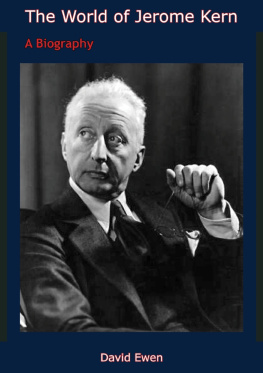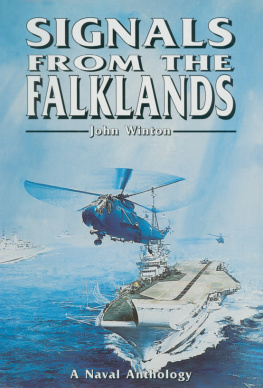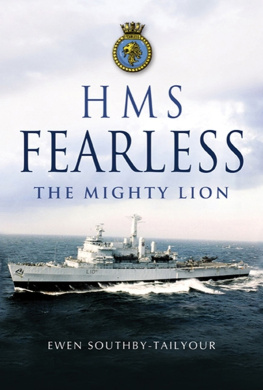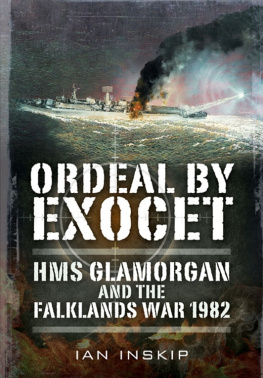Ewen Southby-Tailyour - Exocet Falklands
Here you can read online Ewen Southby-Tailyour - Exocet Falklands full text of the book (entire story) in english for free. Download pdf and epub, get meaning, cover and reviews about this ebook. year: 2014, publisher: Pen & Sword Books, genre: Non-fiction. Description of the work, (preface) as well as reviews are available. Best literature library LitArk.com created for fans of good reading and offers a wide selection of genres:
Romance novel
Science fiction
Adventure
Detective
Science
History
Home and family
Prose
Art
Politics
Computer
Non-fiction
Religion
Business
Children
Humor
Choose a favorite category and find really read worthwhile books. Enjoy immersion in the world of imagination, feel the emotions of the characters or learn something new for yourself, make an fascinating discovery.
- Book:Exocet Falklands
- Author:
- Publisher:Pen & Sword Books
- Genre:
- Year:2014
- Rating:3 / 5
- Favourites:Add to favourites
- Your mark:
- 60
- 1
- 2
- 3
- 4
- 5
Exocet Falklands: summary, description and annotation
We offer to read an annotation, description, summary or preface (depends on what the author of the book "Exocet Falklands" wrote himself). If you haven't found the necessary information about the book — write in the comments, we will try to find it.
Exocet Falklands — read online for free the complete book (whole text) full work
Below is the text of the book, divided by pages. System saving the place of the last page read, allows you to conveniently read the book "Exocet Falklands" online for free, without having to search again every time where you left off. Put a bookmark, and you can go to the page where you finished reading at any time.
Font size:
Interval:
Bookmark:
Other books by Ewen Southby-Tailyour
Military Histories and Biographies
Falkland Islands Shores
Reasons in Writing: A Commandos View of the Falklands War
Amphibious Assault Falklands: The Battle for San Carlos
Blondie: A Life of Lieutenant-Colonel HG Hasler DSO, OBE
The Next Moon. A Special Operations Executive Agent in France
HMS Fearless: The Mighty Lion
3 Commando Brigade, Helmand
Commando Assault, Helmand
Nothing Impossible. A Portrait of The Royal Marines 16642010 (ed.)
Fiction
Skeletons for Sadness
Reference
Janes Amphibious Warfare Capabilities (ed.)
Janes Special Forces Equipment Recognition Guide (ed.)
Janes Amphibious and Special Forces (ed., bi-annual publication)
First published in Great Britain in 2014 by
PEN & SWORD MILITARY
An imprint of
Pen & Sword Books Ltd
47 Church Street
Barnsley
South Yorkshire
S70 2AS
Copyright Ewen Southby-Tailyour, 2014
HARDBACK ISBN: 978-1-78346-387-9
PDF ISBN: 9781473836891
EPUB ISBN: 9781473835139
PRC ISBN: 9781473836013
The right of Ewen Southby-Tailyour to be identified as the author of this work
has been asserted by him in accordance with the Copyright, Designs and
Patents Act 1988.
A CIP catalogue record for this book is available from the British Library.
All rights reserved. No part of this book may be reproduced or transmitted in
any form or by any means, electronic or mechanical including photocopying,
recording or by any information storage and retrieval system, without
permission from the Publisher in writing.
Typeset by Concept, Huddersfield, West Yorkshire, HD4 5JL.
Printed and bound in England by CPI Group (UK) Ltd, Croydon CR0 4YY.
Pen & Sword Books Ltd incorporates the imprints of Pen & Sword Archaeology,
Atlas, Aviation, Battleground, Discovery, Family History, History, Maritime,
Military, Naval, Politics, Railways, Select, Social History, Transport, True Crime,
and Claymore Press, Frontline Books, Leo Cooper, Praetorian Press,
Remember When, Seaforth Publishing and Wharncliffe.
For a complete list of Pen & Sword titles please contact
PEN & SWORD BOOKS LIMITED
47 Church Street, Barnsley, South Yorkshire, S70 2AS, England
E-mail:
Website: www.pen-and-sword.co.uk
Contents
List of Plates
Introduction
This is the story of the French AM 39 Exocet: an air-launched, sea-skimming, anti-ship missile deployed by Argentina against the British during the Falklands campaign in 1982. This missile was a clear danger to the Task Force aircraft carriers, the loss of just one of which would have seriously prejudiced the outcome. By its mere presence the Exocet affected much of the strategic and tactical thinking of the British commanders at sea and in the United Kingdom.
It is also a narrative of three British Special Forces operations designed to destroy those missiles on the Argentine mainland before they could be launched by the Super tendard fighter-bombers that carried them. Operation Plum Duff was a reconnaissance and, if the opportunity arose, a direct action operation by eight men of 6 Troop, B Squadron, 22 Special Air Service Regiment against the Argentine Navys Rio Grande air base in Tierra del Fuego. It was aborted three days after it began. Why it was aborted has been the subject of much imprecise speculation.
Operation Mikado, also against Rio Grande, depended on the intelligence obtained during Operation Plum Duff. It would have been conducted by two Hercules C-130 aircraft of the Royal Air Forces 47 Squadrons Special Forces Flight, landing sixty SAS troopers directly into the Argentine air base. It never took place. Why it never took place also forms much of the material that is between these covers.
Then there was the hitherto unknown, submarine-launched, Special Boat Squadrons Operation Kettledrum against the northern naval air base at Puerto Deseado. That the operation was cancelled just a day after HMS Onyx sailed from San Carlos is instructive enough; but the circumstances surrounding the decision to execute this attack, made in the United Kingdom some weeks before the executive order was given, remain baffling.
This, therefore, is the account of three mainland assaults that might have changed the nature of the Falklands conflict militarily and diplomatically. The political aftermath of such attacks on the South American continent would, too, have had international consequences. The SAS, and to a lesser extent the SBS, would have struggled to recover from the large loss of life they would inevitably have suffered, while the RAF (and thus the dependent Royal Navy) would have certainly lost the use of the only two heavy-lift, long-range aircraft capable (thanks to hastily fitted air-to-air refuelling apparatus) of supplying the Task Force deep in the South Atlantic ocean. As will be described, this became particularly relevant after the loss of the MV Atlantic Conveyor.
Others come into this story: the Secret Intelligence Service (more popularly known as MI6) with its successful war within a war played a crucial part, together with the Royal Navys aircraft carriers and their embarked helicopter crews, plus the nuclear submarines, destroyers and frigates. Argentine warships and marines defending Rio Grandes air base also appear, as do, most notably, the Super tendard pilots themselves.
In many respects (and this is not what I was expecting when I embarked on this project) this is also the story of the Hercules aircraft: those who kept them flying and refuelled in the air as well as their would-be passengers on Operation Mikado the men of B Squadron. Markedly, too, it is the tale of one officer and seven men of 6 Troop during Operation Plum Duff and of the three Fleet Air Arm aircrew that flew their lone Sea King helicopter on a one-way mission into Tierra del Fuego during that austral autumn.
* * *
No one is clear when the code words Plum Duff, Mikado and Kettledrum were first used; some people involved in one or the other claim that they did not know the name of their operation at the time. For the sake of clarity I have referred to them by these names from the beginning. For instance, Commodore Alan Bennett, who, as a Royal Navy lieutenant and helicopter pilot played a pivotal role in Operation Plum Duff, was not aware of its name until long after the Falklands campaign was over. At the time he was to regard it as Just another sortie albeit with a dropping point in a different country and a walk home, behind enemy lines just like all the others we had been doing for special forces since 1 May.
It might appear that I have occasionally strayed from the central subject the Exocet war into the world of submarines and other special forces operations. This has been to add flavour, depth and context to the main theme, so that a feeling for the overall atmosphere might be gained through the use of what a Highland piper would call the grace notes.
While other published accounts have alluded to Operations Plum Duff and Mikado, not one has yet mentioned Kettledrum. As I am privileged to be in contact with primary sources on both sides of the Atlantic (and have visited Buenos Aires, Puerto Madryn, Rio Grande, Rio Gallegos, Ushuaia, Santiago, Punta Arenas and Puerto Montt, and flown across the pampas between these southern towns and cities), the best way forward is to ensure that this account stands on its own. I have therefore not compared my findings with those of others except where significant matters of fact needed to be unpicked and re-examined.
There are, inevitably, criticisms of a few sacred cows it would be unrealistic to expect otherwise in any war. There is, though, a culture of maintaining the myth within some sectors of British special forces that is not always conducive to good military practice. The SAS, for instance, are supremely efficient in counter-insurgency operations and, because of that capability, are often asked to attempt near-impossible conventional operations for the wrong reasons: Operations Plum Duff and Mikado are prime examples. As Major General Jeremy
Next pageFont size:
Interval:
Bookmark:
Similar books «Exocet Falklands»
Look at similar books to Exocet Falklands. We have selected literature similar in name and meaning in the hope of providing readers with more options to find new, interesting, not yet read works.
Discussion, reviews of the book Exocet Falklands and just readers' own opinions. Leave your comments, write what you think about the work, its meaning or the main characters. Specify what exactly you liked and what you didn't like, and why you think so.

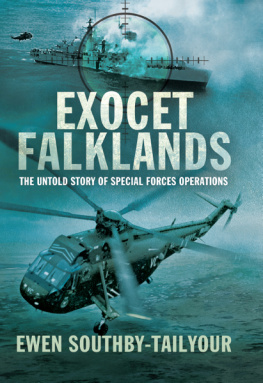
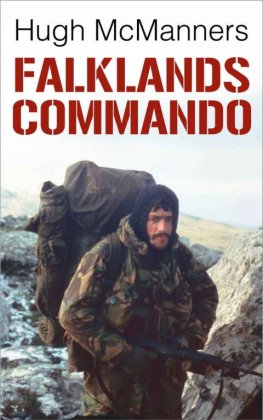


![Barry Bingham - Falklands, Jutland And The Bight [Illustrated Edition]](/uploads/posts/book/291116/thumbs/barry-bingham-falklands-jutland-and-the-bight.jpg)
